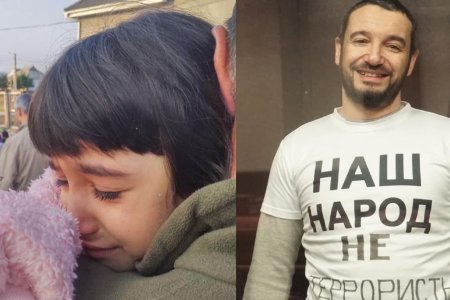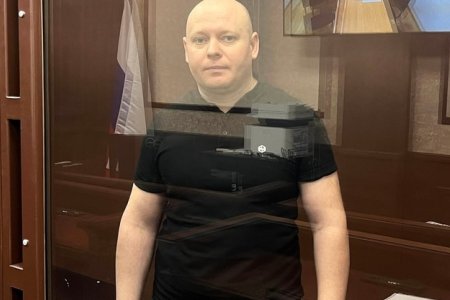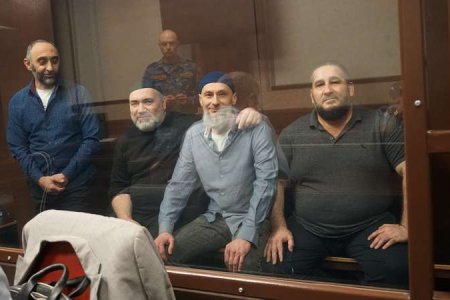
“17 years’ imprisonment for comments on a paragraph in a book, just think about it! That plea, during his final address, from Raif Zevziev was scarcely a lot to ask Russia’s military court of appeal in Vlasikha (Moscow region) at the appeal hearing on 30 September. Yet the ‘judges’ there ignored the Crimean Tatar former imam and civic activist and upheld a 17-year sentence on ‘terrorism’ charges based solely on an innocuous religious discussion illicitly taped by Russia’s FSB almost six years earlier. In rubberstamping yet another politically motivated sentence against Crimean Tatars, the ‘judges’ also ignored the fact that they were not just destroying Fevziev’s life, but also that of his family, and particularly his two sons and small daughter.
Arrest
Armed Russian FSB and other enforcement officers burst into the homes of Raif Fevziev and four other Crimean Tatars on 17 August 2021. All five men had actively supported political prisoners and their families. Fevziev, who was the imam of his local Muslim community, held prayer services before hearings where politically-motivated sentences were due, and also attempted hearings in such cases.
These armed ‘searches’ are essentially about intimidation and propaganda, with the FSB making no pretence of looking for anything except ‘prohibited religious literature’. Indeed, one of the reasons why lawyers representing the men are never allowed to be present is that the FSB typically bring the ‘prohibited’ material with them, and then claim to have ‘found’ it. Fevziev’s wife stated immediately after the ‘search’ that the officers had claimed to have found the religious literature among her pots, something that is quite inconceivable for any devout Muslim family.
Fevziev and the other men were all taken away and have been imprisoned ever since.
‘Terrorism’ charges without any recognizable crime
Russia is, in any case, in violation of international law through its application of Russian legislation on occupied territory, however its use of fake ‘terrorism’ charges is shocking for other reasons also. The charges are based solely on a flawed and deliberately secretive Russian supreme court ruling from February 2003. This banned several organizations as ‘terrorist’ including Hizb ut-Tahrir, a peaceful, if controversial, transnational Muslim organization which is legal in Ukraine and which is not known to have committed acts of terrorism or violence in Russia, or anywhere else. The ruling gave no explanation as to why Hizb ut-Tahrir had been included, and was kept hidden until it could no longer be challenged in court. Since 2014 it has been used to imprison men for up to 24 years and is increasingly used in occupied Crimea as a weapon against Crimean Tatar civic activists and journalists.
Fevziev was charged with the more serious Article 205.5 § 1 of Russia’s criminal code (organizing a ‘Hizb ut-Tahrir cell’). In all such cases in occupied Crimea, the FSB also add a preposterous charge, under Article 278, of ‘planning to violently seize power’.
‘Evidence’
Remove inverted commas and the answer is simple – there was none.
The prosecution’s ‘case’ was based on an illicitly taped conversation on religious issues back on 11 December 2015. This had been in Fevziev’s own home, with the FSB having been able, if they had genuinely believed him to have any involvement in ‘terrorism’, to apprehend him for the past six years.
The prosecution claimed that “from a date which the investigation has not established”, but no later than 11 December 2015, a Hizb ut-Tahrir group was functioning in the Simferopol raion. Not one member of this alleged ‘group’ has been identified, yet the FSB claim that Fevziev was its ‘organizer’
It is further asserted that, from some equally unknown point, but no later than 11 December 2015 and before his arrest on 17 August 2021, Fevziev “carried out covert anti-Russian, anti-constitutional activities, in the form of propaganda work among the population, encouraging local residents to take part” in the alleged, and entirely unproven, Hizb ut-Tahrir group. Fevziev and his ‘group’ were supposed to have held conspiratorial meetings of its unidentified members. sought to recruit others in it, etc.
The only ‘evidence’ for any of these assertions came from two anonymous ‘witnesses’ referred to by the pseudonyms F. Ismailov and R. Abdullayev. These supposed witnesses were able to almost verbatim repeat the indictment, but could not answer the simplest question about the defendant, the circumstances of their alleged meetings, etc.
Edem Semedlyaev, Fevziev’s lawyer, points out that ‘secret witness Ismailov’ was not, in fact, one person but two or more. The prosecution was for a long time unable to arrange this individual’s ‘testimony’ in court (by video link, from another room, with even his voice distorted). Having failed to find him, they simply put somebody else in, pretending that the new person was ‘Ismailov’.
All of this is with the full connivance of the court. No proof is ever provided that a person has any reason to fear giving testimony under their own name, yet the court invariably allows a situation where the defendants receive huge sentences although the only witnesses were people whose identity is unknown and whose testimony is there difficult to verify. The presiding judge typically blocks questions aimed, not at exposing the ‘secret witness’ identity, but at demonstrating that they are lying.
Sentence
The ‘trial’ took place at the notorious Southern District Military Court in Rostov before Viacheslav Alekseevich Korsakov (presiding), Denis Aleksandrovich Galkin and Igor Viktorovich Shendrikov. On 12 January 2023, these individuals convicted Raif Fevziev of the charges and sentenced him to 17 years, as had earlier been demanded by the prosecutor. That sentence has now been upheld by the court in Vlasikha, with Fevziev likely to be sent to a prison thousands of kilometres from his home and family. The first three years of this sentence are to be spent in a prison, the worst of Russia’s penitentiary institutions, with the rest in a harsh-regime prison colony.



